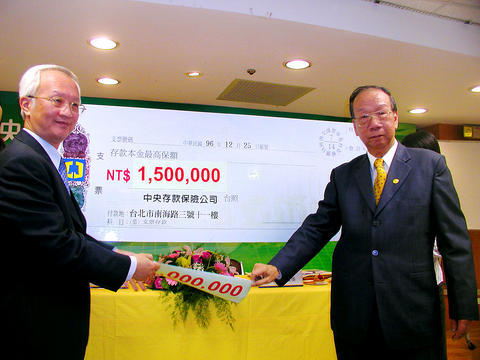The state-run Central Deposit Insurance Corp (CDIC, 中央存保) aims to offer insurance coverage to banks that are performing well at no cost after the CDIC's funds reach NT$200 billion (US$6.15 billion).
This proposal is aimed at addressing what some call an unfair situation in which there is not much difference between the premiums paid by troubled banks and those that perform well, a CDIC official said yesterday.
"Large-sized financial institutions are currently paying between NT$100 million and NT$200 million in insurance premiums to the CDIC each year," Johnson Chen (

PHOTO: LAN CHUN-TA, TAIPEI TIMES
"These institutions would be able to save their money if they reached the CDIC's standards, such as having a capital adequacy ratio higher than 10 percent, a non-performing loan ratio lower than 5 percent and profitability that meets the market average," he said.
After taking over five debt- ridden banks this year -- the Enterprise Bank of Hualien (
Chen said that because of the insufficient funds available for financial restructuring, the CDIC was covering 80 percent of the payments to buyers taking over debt-ridden banks, while the government's financial restructuring fund was paying the remaining 20 percent.
The government financial re-structuring fund is expected to come to an end in 2010 after it resolves the takeover of the nation's seven ailing banks, he said.
"Approximately NT$4.4 billion of the CDIC's funds comes from the insured institutions' annual premiums," Chen said.
"Two percent of the business tax for financial services will be injected into the CDIC's funds beginning in 2011 and is estimated to come to about NT$17 billion each year, accumulating NT$21.4 billion annually," Chen said. He estimates that starting from 2011, it would take the CDIC 10 years to reach its goal of NT$200 billion in 2021.
Beginning July 1, the nation's depositors will be able to receive NT$1.5 million maximum in insurance coverage per insured institution under the amended Deposit Insurance Act (

SEEKING CLARITY: Washington should not adopt measures that create uncertainties for ‘existing semiconductor investments,’ TSMC said referring to its US$165 billion in the US Taiwan Semiconductor Manufacturing Co (TSMC, 台積電) told the US that any future tariffs on Taiwanese semiconductors could reduce demand for chips and derail its pledge to increase its investment in Arizona. “New import restrictions could jeopardize current US leadership in the competitive technology industry and create uncertainties for many committed semiconductor capital projects in the US, including TSMC Arizona’s significant investment plan in Phoenix,” the chipmaker wrote in a letter to the US Department of Commerce. TSMC issued the warning in response to a solicitation for comments by the department on a possible tariff on semiconductor imports by US President Donald Trump’s

The government has launched a three-pronged strategy to attract local and international talent, aiming to position Taiwan as a new global hub following Nvidia Corp’s announcement that it has chosen Taipei as the site of its Taiwan headquarters. Nvidia cofounder and CEO Jensen Huang (黃仁勳) on Monday last week announced during his keynote speech at the Computex trade show in Taipei that the Nvidia Constellation, the company’s planned Taiwan headquarters, would be located in the Beitou-Shilin Technology Park (北投士林科技園區) in Taipei. Huang’s decision to establish a base in Taiwan is “primarily due to Taiwan’s talent pool and its strength in the semiconductor

An earnings report from semiconductor giant and artificial intelligence (AI) bellwether Nvidia Corp takes center stage for Wall Street this week, as stocks hit a speed bump of worries over US federal deficits driving up Treasury yields. US equities pulled back last week after a torrid rally, as investors turned their attention to tax and spending legislation poised to swell the US government’s US$36 trillion in debt. Long-dated US Treasury yields rose amid the fiscal worries, with the 30-year yield topping 5 percent and hitting its highest level since late 2023. Stocks were dealt another blow on Friday when US President Donald

UNCERTAINTY: Investors remain worried that trade negotiations with Washington could go poorly, given Trump’s inconsistency on tariffs in his second term, experts said The consumer confidence index this month fell for a ninth consecutive month to its lowest level in 13 months, as global trade uncertainties and tariff risks cloud Taiwan’s economic outlook, a survey released yesterday by National Central University found. The biggest decline came from the timing for stock investments, which plunged 11.82 points to 26.82, underscoring bleak investor confidence, it said. “Although the TAIEX reclaimed the 21,000-point mark after the US and China agreed to bury the hatchet for 90 days, investors remain worried that the situation would turn sour later,” said Dachrahn Wu (吳大任), director of the university’s Research Center for